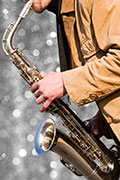

Music therapy might someday help people with epilepsy, a new study suggests.
About 80 percent of epilepsy patients have temporal lobe epilepsy, in which seizures originate in the temporal lobe of the brain. Music is processed in the auditory cortex, located in the same region of the brain, which is why researchers from Ohio State University’s Wexner Medical Center wanted to study the connection.
The study authors said that the brains of epilepsy patients appear to react to music differently from the brains of people without the disorder.
“We believe that music could potentially be used as an intervention to help people with epilepsy,” Christine Charyton, adjunct assistant professor and visiting assistant professor of neurology, said in an American Psychological Association (APA) news release. Charyton plans to present the research Sunday at the APA’s annual meeting in Toronto.
The researchers looked at how different types of music and silence were processed in the brains of 21 people with epilepsy. Whether listening to classical music or jazz, all of the participants had much higher levels of brain wave activity when listening to music, the study found.
Brain wave activity in the epilepsy patients tended to synchronize more with the music, especially in the temporal lobe, the researchers said.
“We were surprised by the findings. We hypothesized that music would be processed in the brain differently than silence. We did not know if this would be the same or different for people with epilepsy,” Charyton said.
Music therapy wouldn’t replace current epilepsy treatments, but might offer a new method to use in conjunction with traditional approaches to help prevent seizures, she concluded.
Findings presented at meetings are generally considered preliminary until published in a peer-reviewed journal.
More information
The American Academy of Family Physicians has more about epilepsy.
Source: HealthDay
Copyright © 2025 HealthDay. All rights reserved.

Leave a Reply